7 Natural Ways to Lower your Blood Pressure
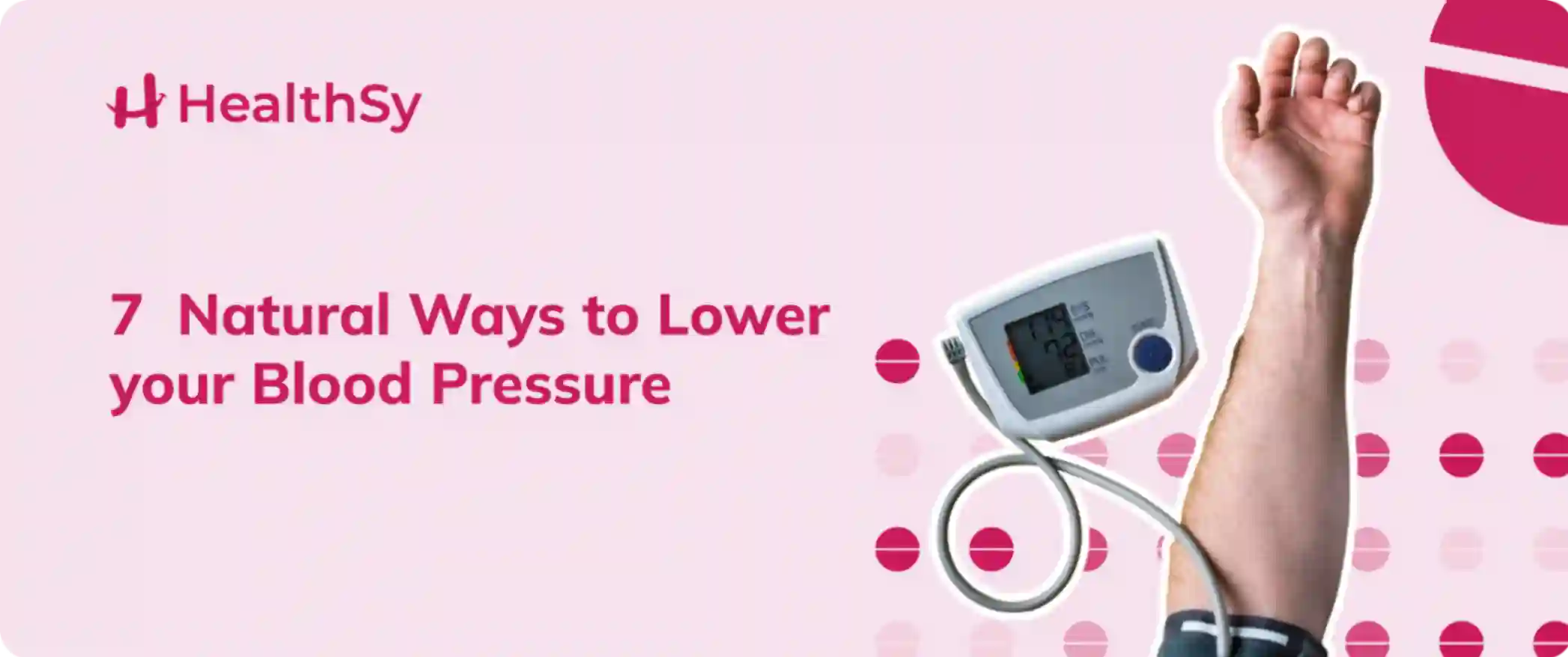
High blood pressure/ hypertension, a common health issue,
prevalent among many, occurs when blood flows through the vein at a high rate
of pressure. Also known as the silent killer this condition is asymptomatic and
leads to multiple major health issues: damage to heart and kidney, stroke, memory
loss, angina, and peripheral artery disease.
Normal systolic and diastolic pressure ranges below 120mmHg
and 80mmHg, and one is diagnosed with high blood pressure condition when the
ranges are present above the normal levels. Diastolic pressure is when the heart
is at rest between the beats, while systolic pressure is the measure of blood pressure
when the heart beats. In everyday activity there exists fluctuations in blood
pressure; when sleeping and waking up, when being active etc., but in these
cases the pressure returns to normalcy.
Some may wonder if blood pressure can be controlled without medications!?
Well, since there exists no treatment that treats hypertension, but is only
controlled using medicines. Though moderate lifestyle changes can be vital in maintaining BP levels without medications. Listed
below are a few of the simple tips/remedies:
Sodium intake:
Many people use “salt” and “sodium” interchangeably, where salt is a crystallized compound of sodium and chloride. Sodium is an important
mineral that helps with muscle contraction and the maintenance of body fluid.
Sodium, in increased concentration, tends to absorb more water into the vessel. This
results in increased blood volume, which equals more pressure.
On average, a daily intake of 2300mg is the limit, however, those diagnosed with this condition can incorporate up to 1,500 mg. Even a
minute reduction in consumption of sodium intake aids in bringing down the
pressure by almost 5-6mm Hg and improves heart health.
Lose those extra inches:
Nothing like losing that extra weight around your
waistline to bring in that tremendous change to a healthier lifestyle!! Blood
pressure is found to increase with increasing body weight, one such example is
when taking a flight of stair is a herculean task with the feeling of
breathlessness. With each kg lost, 1 mmHg pressure is reduced!! The waistline recommended
by Medicos is around 40 inches for men and 35 inches for women, the ranges
that are optimally healthy.
Keep Movin’
With all that said about losing inches, it all comes down to
exercising. Studies have shown that including regular physical activity can
lower pressure by 5-8mmHg. And to keep it at safer levels, being physically
active is important. To begin with, one can, start with moderate physical
activity for 30 minutes a day, and can advance to higher-intensity workouts.
Healthy food to make you feel good!
Blood pressure can be lowered, up to 11mmHg, just by having a
hearty healthy meal, which is inclusive of veggies, fruits, whole grains, and
low-fat dairy products.
The inclusion of potassium, 3500-5000mg/day, has been found to
have a significant impact on lowering blood pressure by 4-5mmHg. Potassium alleviates
tension in the blood vessels and reduces the effect of salt. Best sources of potassium-rich foods include spinach, sweet potatoes, fish-fat milk, and yogurt.
Healing with herbal…
Usage of herbs to alleviate ailments has been in practice in
many cultures for ages now! Certain herbs: celery juice (Apium graveolens),
ginger root, sesame oil, and tomato extract (Lycopersicon esculentum) are found
to be effective in lowering blood pressure, and many more herbs are under research
and study. It is also advised to check with a medical
advisor or pharmacist before taking herbal supplements to avoid interaction with
prescribed medicines.
The best day is quitting day!
And that stands true for quitting smoking and alcohol consumption,
which is the best option for your overall health! Though
it may seem difficult, trying to quit can be every ounce worth it!
The chemicals released from smoke are very harmful to both
active and passive smokers as well, as they tend to harden and narrow the
arteries, causing swelling and damage to blood vessels, all of which lead to an increase in blood pressure.
Lowering alcohol consumption to one drink a day can lower
up to 4mmHg of pressure. It has also been found in studies that alcohol can diminish
the effect of blood pressure medications.
Sleep your way to better health!
Stress has been a major contributor to rising blood
pressure! Though there are a lot of factors that contribute to this- work, family,
illness, or financial issues, no specific reason has been found yet.
It is only advised to keep
oneself stress-free by following these:
-
Planning and mindful scheduling of day-to-day activities,
so that one does not load too much on their plate!
-
Avoiding stress triggers
-
Keeping boundaries
-
Practicing yoga and meditation
-
Maintaining a proper sleep cycle
Keeping an eye on vitals at regular
intervals
Monitoring blood pressure at home, at regular intervals can help in keeping track of our health and bringing in the necessary lifestyle changes that are needed. Talking to your medical provider about the same can also be beneficial in controlling blood pressure. Devices are now easily accessible and can be used with ease.
It is important to not panic and to
keep the mind in a relaxed state. Carve out time for doing things that you enjoy
the most: music podcasts, gardening, etc., Incorporate small moments of joy
throughout the day. Good healthcare is the way to a happy and healthier life!!
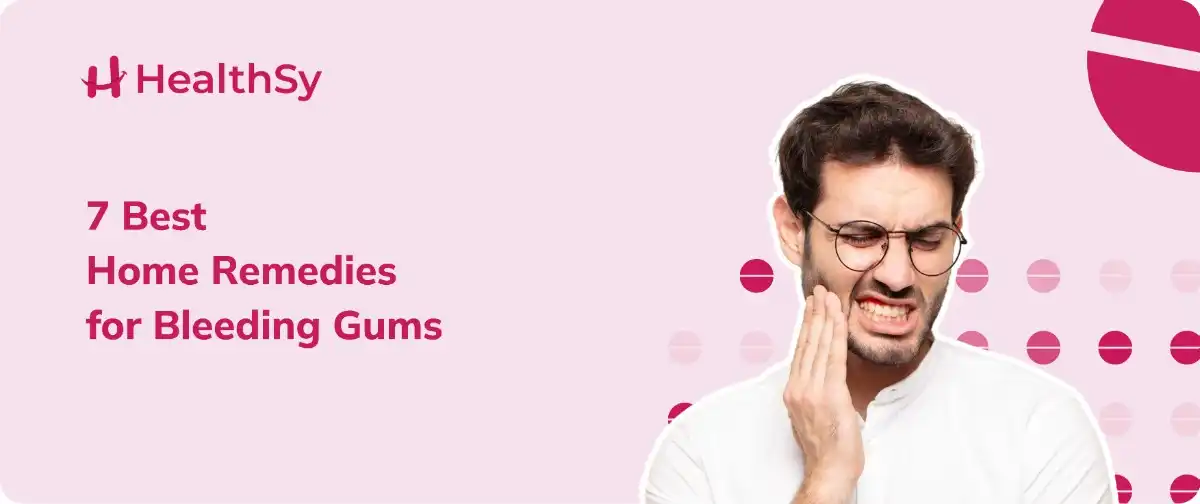
If you find blood while brushing, it may be a sign of gum disease or gingivitis.
Bleeding gums or gingival bleeding is a common symptom of poor oral hygiene. Neglecting the condition may eventually lead to tooth loss and bone loss around the teeth. However, in the initial stage of bleeding gums, you can prevent it by using simple home remedies to help stop the progressive damage.
Here are the top 7 effective remedies for bleeding gums:
1. Rise with Saltwater
Bleeding gums have several causes, among which bacterial growth and inflammation in the mouth are significant causes. These issues can often be managed effectively by rinsing the mouth with warm saltwater.
Rinsing with salt water can soothe the inflamed gums, restrict bacteria, and ease pain. Mix a teaspoon of salt with a cup of warm water and swish it around in your mouth for about 30 seconds before spitting it out.
2. Use Turmeric
Turmeric is one of the best home remedies for bleeding gums. It has powerful antibacterial and anti-inflammatory properties. The bioactive ingredient curcumin helps treat bleeding gums and speed up wound healing.
Turmeric is a readily available ingredient in the Indian kitchen. Apply a pinch of turmeric directly to the gums and massage the area for about a minute to help heal gum bleeding.
3. Try Clove Oil
Clove oil is widely seen as an acceptable alternative treatment for bleeding gums. Its natural antiseptic properties can help reduce inflammation and kill bacteria in the mouth, providing temporary relief.
Dab a small cotton piece into the clove oil and rub it all over the gums. After a minute, rinse your mouth with water to treat bleeding gums. In addition, clove oil's aromatic properties can also help freshen breath. However, use clove oil in moderation, as excessive use can cause irritation or allergic reactions in some individuals.
4. Apply Aloe Vera Gel
Aloe vera gel is known for its anti-inflammatory properties, which help to reduce gum inflammation and make bleeding less likely. To reap the benefits of aloe vera gel, apply it directly to the gums, focus on the bleeding area, and leave it for 5- 10 minutes. Then, rinse your mouth with water.
Try this remedy 2-3 times daily for better results.
5. Coconut Oil Pulling
Coconut oil contains lauric acid, which has been shown to fight harmful bacteria. The antimicrobial properties in the coconut oil can help reduce bacteria, plaque, and inflammation in the gums, making it an effective remedy for bleeding gums.
Take about 1 tablespoon of coconut oil and swish it around your mouth for 10-15 minutes. Spit the oil, rinse your mouth with water, and brush your teeth as usual.
6. Try Neem
Neem is a year-old Ayurvedic medicine. It has powerful antibacterial, anti-inflammatory, and antimicrobial properties. It can help combat gum disease, reduce inflammation, and promote healthy gums, making it an excellent natural remedy for bleeding gums.
Boil a handful of neem leaves in water for about 10-15 minutes. Let the mixture cool, then strain the leaves. Use this water as a mouth rinse 2-3 times a day.
7. Drink Green Tea
Green tea contains antioxidants, notably polyphenols, which have potent anti-inflammatory and antimicrobial properties. It is known for promoting oral health and preventing gum disease, making it an excellent remedy for bleeding gums.
Drinking 1-2 cups of green tea a day can provide internal support for gum health.
Bottom Line
Bleeding gums can often be treated with effective remedies and good oral hygiene practices. However, frequent bleeding gums indicate underlying gum disease or health issues. Consulting a dentist can help you with further complications. Regular dental check-ups and cleanings are essential for maintaining good oral health and preventing more serious problems in the future.
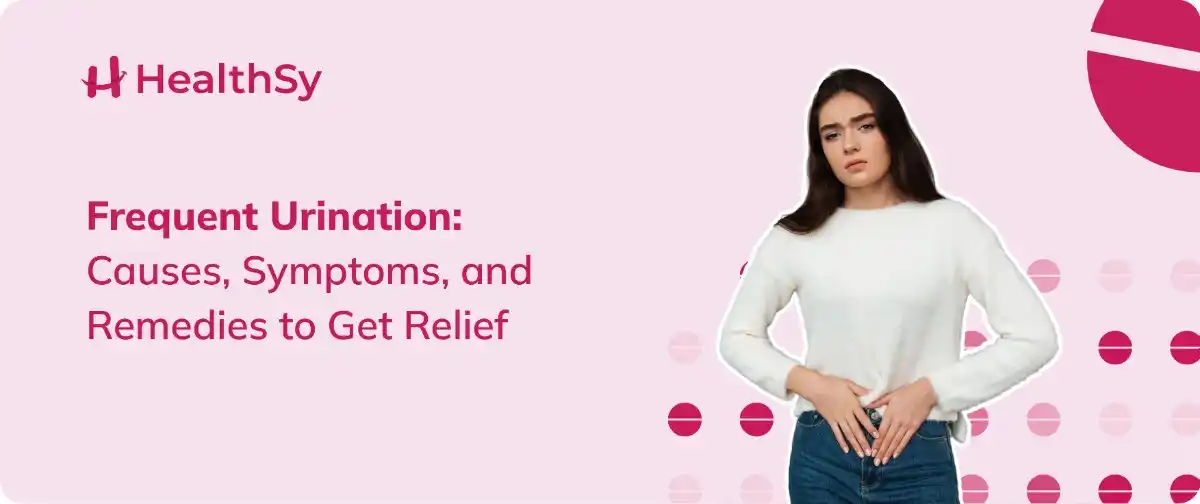
Frequent urination is a common health condition characterized by the need to urinate more often than usual (4 to 8 times a day). This can be uncomfortable and frustrating, disrupting the daily activities and sleep patterns of an individual. Therefore, this blog will explore the causes of frequent urination, common symptoms to look out for, and effective remedies to help alleviate this condition.
What is Frequent Urination?
Frequent urination refers to the need to pass urine more often than usual. It can be caused by conditions such as pregnancy and certain medical issues. In addition, it affects all aged people but is more common in older adults due to changes in bladder function. It is important to consult with a healthcare provider if frequent urination becomes a persistent
Causes of Frequent Urination
Frequent urination can be caused by a variety of factors. These factors can include:
- Urinary Tract Infection (UTI): Urinary tract infections are a common cause of frequent urination, as they can irritate the bladder and cause a frequent urge to urinate.
- Diabetes: Diabetes can lead to frequent urination as high blood sugar levels can increase urine production.
- Pregnancy: Pregnancy can also cause frequent urination due to hormonal changes and the growing uterus putting pressure on the bladder.
- Overactive Bladder: Overactive bladder is a condition where the bladder muscles contract involuntarily, leading to frequent and sudden urges to urinate.
- Prostate Issues: Prostate issues in men, such as an enlarged prostate or prostate cancer, can obstruct the flow of urine and result in frequent urination.
Frequent Urination Symptoms
- A strong urge to urinate, which may be difficult to control
- Pain or burning sensation while urinating (often associated with UTIs)
- Cloudy or strong-smelling urine
- Blood in the urine (hematuria)
- Discomfort or pressure in the pelvic area
- Inability to fully empty the bladder when urinating
- Nocturia (waking up multiple times during the night to urinate)
Remedies to Get Relief from Frequent Urination
- Stay Hydrated: Drinking plenty of water is essential for your health but drinking too much can also increase urination. Try to balance your fluid intake throughout the day and avoid drinking large amounts right before bedtime to prevent nighttime trips to the bathroom.
- Practice Bladder Training: Bladder training helps you train your bladder to hold urine longer. It does this by slowly increasing the time between bathroom trips. Start by waiting 5 to 10 minutes longer than you usually do before going to the bathroom. Gradually increase this time. This can reduce the urge to go frequently.
- Medication: If lifestyle changes and bladder training are not effective in managing frequent urination, your healthcare provider may recommend medication to help control symptoms.
- Avoid Bladder Irritants: Some foods and drinks can irritate the bladder, such as spicy foods, acidic fruits, and artificial sweeteners. Pay attention to your diet and consider eliminating or reducing bladder irritants
- Treat Underlying Conditions: If your frequent urination is due to an underlying condition like a UTI, diabetes, or an enlarged prostate, treating the condition is key to resolving the issue. Consult with your doctor to develop a treatment plan.
When to See a Doctor?
Frequent urination can sometimes be a sign of a serious condition. You should seek medical attention if:
- The urge to urinate is accompanied by pain, blood, or a burning sensation
- You experience incontinence or an inability to control urination
- Your frequent urination is interfering with your daily activities
- You notice other symptoms like extreme thirst, fatigue, or weight loss (possible signs of diabetes)
- There is blood in your urine, or the urine appears cloudy or foul-smelling
Conclusion
Frequent urination is a common condition, but it can sometimes signal a more serious health problem. By understanding the causes and recognizing the symptoms, you can take steps to address the issue and seek appropriate treatment. Whether through lifestyle changes, medications, or medical procedures, there are numerous ways to get relief and manage frequent urination effectively. If the problem persists or worsens, don’t hesitate to consult with a healthcare professional for guidance and support.
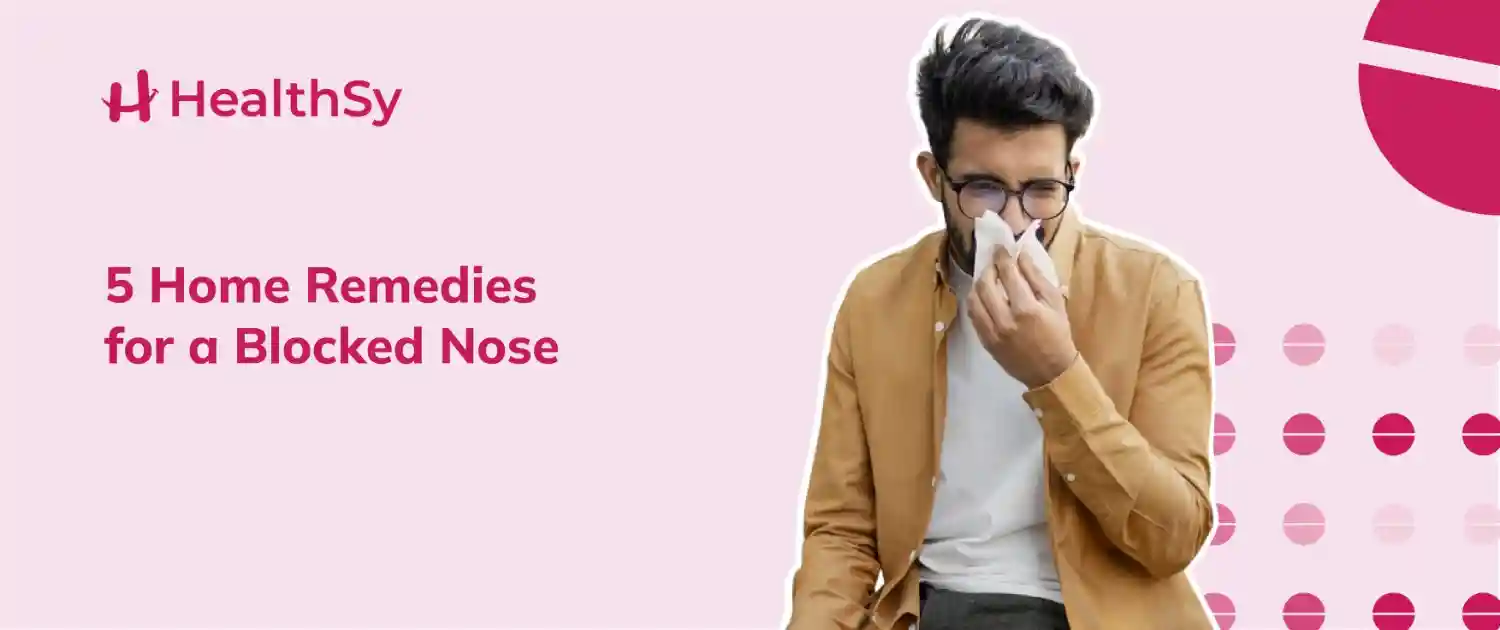
Dealing with a blocked nose can be frustrating and may hinder your breathing, sleep, and life routine. It may arise from numerous reasons, including allergies, colds, and sinus problems. This blocked nose is sometimes cured on its own. However, with some easy home remedies, we can get relief from nose block. This article will give 5 top home remedies that help you get rid of a blocked or stuffy nose. Let's get started!
Blocked Nose
A blocked nose is a condition in which the air passage through the nose becomes challenging, making breathing difficult. It also disturbs an individual's sleep cycle, which may lead to headaches, fatigue, and loss of smell.
A blocked nose is a build-up of mucus in the nose, which can be caused by any of the following reasons:
- Infections like the common cold, flu, sinusitis, or hay fever.
- Irritants like cigarette smoke, dust, pollution
- Weather changes
Here are some top 5 home remedies that can help relieve you from nose block or nasal congestion.
Try Humidifier
Dry air makes nasal congestion difficult and even worsens it. A humidifier is one of the best choices for keeping the air moist; this simple home remedy can soothe irritant nasal tissues, lessen sinus inflammation, and thin mucus. However, the steam from the warm-mist humidifier is not preferable for children, so consult with experts before using it.
Take Hot Shower
A hot shower can provide instant relief from a blocked nose. The steam from the shower may help thin the mucus, reduce inflammation, and improve airflow. Taking a long shower and adding peppermint essential oils can give better relief. In addition, keep in mind that while taking a hot shower, don't burn your face on the hot water or steam.
Stay Hydrated
Staying hydrated is a highly effective remedy for nasal congestion. It helps thin the mucus in your nasal passages, allowing it to drain more easily and reducing pressure, inflammation, and irritation. Make sure to drink plenty of water throughout the day, and consider sipping on warm teas like chamomile, peppermint, or ginger tea to soothe your symptoms.
Try Warm Compress
Place a warm compress over your nose and forehead to help reduce nasal inflammation and ease discomfort. You can make a simple compress home by heating a clean towel or cloth in warm water, squeezing out the excess, and gently placing it on the nose and forehead.
Steam Inhalation for Relief
Steam inhalation is an easy and simple remedy for a blocked nose. Take a bowl of boiled water and add a few drops of eucalyptus or tea tree oil. Lean over the bowl and cover your head with a thick cloth. Inhale deeply for about 10 to 15 minutes, which gives instant relief from the blocked nose. Try it two times a day for better results.
Bottom line
A blocked nose does not always require medication; it is a common condition that can be managed with these simple home remedies. However, if it persists, consult with your doctor. They may provide certain over-the-counter medicines.

Have you ever felt a burning, gnawing
sensation in your stomach, followed by bloating and discomfort? If so, you're
familiar with the pain of stomach issues. Whether it's from eating spicy meals,
stress, or other causes, digestive issues can ruin your day and leave you
feeling exhausted and uncomfortable. But do not be afraid! Nature has provided
us with a treasure trove of treatments that can provide immediate relief from
gastric problem, all from the comfort of our own homes.
Understanding Gastric Problem
Before delving into the remedies, it is
crucial to first comprehend the root cause of a gastric problem. Symptoms of
stomach problems usually include gas, bloating, or indigestion. They can be
caused by overeating, hot food consumption, stress, or even certain medical
conditions. Recognizing the symptoms early on will help you treat the condition
more quickly and efficiently.
1. Ginger Tea
Ginger is widely recognized for its potent
anti-inflammatory properties, making it a popular choice for alleviating
gastric problems. Gingerol, one of the substances found in this spicy root, can
help neutralize stomach acid and relieve inflammation. Try sipping on a warm
cup of ginger tea or chewing on a piece of fresh ginger after meals to reap its
benefits.
How to Use:
- Boil a
few slices of fresh ginger in water for about 10 minutes.
- Strain
the tea and add a bit of honey for sweetness.
- Sip it
slowly to relieve your gastric problem.
2. Baking Soda
Have you ever thought that a common
household product like baking soda could be such a potent ally in the battle
against gastric problems? This powder has remarkable properties that can
effectively neutralize stomach acid and alleviate discomfort. This easy remedy
can relieve acid reflux and heartburn quickly.
How to Use:
- Mix about half a
teaspoon of baking soda in a glass of warm water.
- Drink this
solution slowly.
3. Apple Cider Vinegar
Apple cider vinegar has been used for
generations as a traditional treatment for gastric problems. Apple
cider vinegar contains acetic acid, which has the potential to enhance
digestion and alleviate bloating and gas.
How to Use:
- In a glass of warm water, mix one or two
tablespoons of apple cider vinegar.
- A spoonful of honey can be added for
greater flavour.
- Drink this mixture before meals.
4. Fennel Seeds
Fennel seeds have been utilized as a
natural remedy for promoting healthy digestion and alleviating gastric problems
since ancient times. Carminative and anti-inflammatory compounds are found in
these aromatic seeds, which can effectively alleviate gas, bloating, and
abdominal discomfort.
How to Use:
- For immediate relief, try chewing on a
teaspoon of fennel seeds after meals.
- You can also make fennel tea by boiling
the seeds in water and straining the liquid.
5. Chamomile Tea
Chamomile tea is not only a soothing
drink, but it also acts as a natural remedy for digestive issues. This herb is
known for its gentle nature and high flavonoid content, which can effectively
alleviate stomach cramps and bloating.
How to Use:
- In boiling water,
steep a chamomile tea bag for five to ten minutes.
- Sip your tea
gradually.
6. Peppermint
Due to its cooling and refreshing
properties, peppermint has been a popular choice for soothing digestive
distress for a long time. Peppermint contains menthol, which has antispasmodic
and analgesic properties. These properties can be beneficial in relaxing
stomach muscles and relieving cramps and nausea.
How to Use:
- You can chew on
fresh peppermint leaves.
- Alternatively,
brew a cup of peppermint tea by steeping the leaves in hot water for 10
minutes.
7. Probiotics
A healthy gut is essential for overall
digestive health, and probiotics play an important role in this process. These
helpful bacteria contribute to a healthy gut flora, which can aid with gastric problems
and digestion. Eat more foods high in probiotics, such as kefir, yogurt, or
fermented vegetables, to help balance your gut and alleviate gastric problems.
Managing a gastric problem can be quite
frustrating, but these home remedies are here to provide you with swift and
effective relief. These natural solutions, starting with ginger tea to
chamomile, are not only simple to prepare but also gentle on your system. When
you encounter that familiar discomfort again, give one of these remedies a try
and witness the immediate relief they can provide. But it is always advisable
to consult your healthcare professional if you find anything abnormal after
trying out these home remedies.
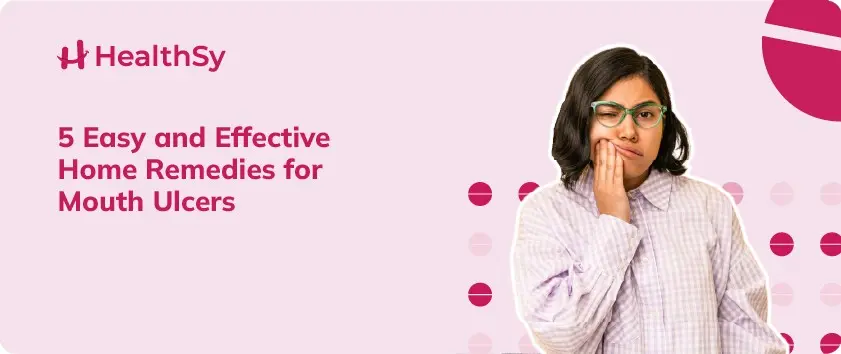
If you have ever experienced a mouth
ulcer, you can completely relate to how painful it is. You cannot easily enjoy
your comfort food, and even simple tasks like talking or brushing your teeth
can become difficult. Here are some age-old remedies that help relieve mouth ulcers at home, and the best part is that you can prepare these traditional
remedies on your own.
1. Honey
Honey is widely recognized for its
calming, antibacterial, and antioxidant properties. Its antibacterial properties and anti-inflammatory effects
can provide relief from the pain and inflammation caused by mouth ulcers. Take a small amount of honey and
apply it directly to the affected area, preventing the skin from drying and
speeding up the healing process.
2. Saltwater Rinse
Saltwater is highly effective in treating
mouth ulcers. Gargling with saltwater is an effective method for cleansing
ulcers and reducing bacteria in the mouth. Combine a teaspoon of salt with warm
water. Make sure to gargle twice a day to effectively reduce swelling and
promote healing.
3. Turmeric
Turmeric is widely recognized for its
medicinal properties and is commonly used to treat various health conditions.
Turmeric has antiseptic properties that can help fight infections and reduce
inflammation and pain caused by mouth ulcers. Create a paste by combining
turmeric powder with a small amount of water, then apply it directly to the
ulcer. Allow it to remain in your mouth for a few minutes before rinsing. Make
sure to follow this regimen twice a day.
4. Coconut Oil
Coconut oil is known for its
anti-inflammatory and antimicrobial properties, which make it a highly
effective solution for treating mouth ulcers. Apply a small amount of coconut
oil to the ulcer or rinse your mouth with a teaspoon of coconut oil for a few
minutes before spitting it out. This technique, commonly referred to as oil
pulling, has been found to be effective in alleviating discomfort and speeding
up the healing process.
5. Clove Oil
Clove oil is often used in a variety of natural remedies,
especially for oral and dental care. This product contains eugenol and
antimicrobial properties that are highly effective in addressing a range of
oral concerns. Before
using clove oil, it is recommended to rinse your mouth with warm water. Apply the oil directly to the ulcer. This can help
alleviate the pain and inflammation.
- If your condition does not improve within 5-7 days.
- If the ulcer has become more red and painful, it may show a
bacterial infection that requires treatment with antibiotics.
- If the mouth ulcer is caused by inflammation or a potential nutritional deficiency, such as folate, iron, or vitamin B, it may be necessary to undergo blood tests.
In conclusion, maintaining consistent oral hygiene and ensuring adequate
hydration are effective measures to decrease the likelihood of developing mouth
ulcers in the future. When experiencing a mouth ulcer, it is prudent to
consider the use of home remedies. However, if the ulcer does not
improve or continues to bother you, it is best to consult with a doctor for a
personalized treatment plan.

Post A Comment